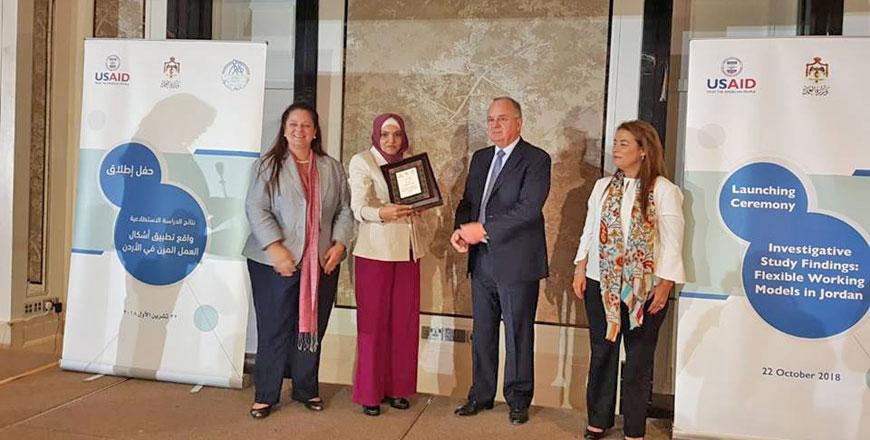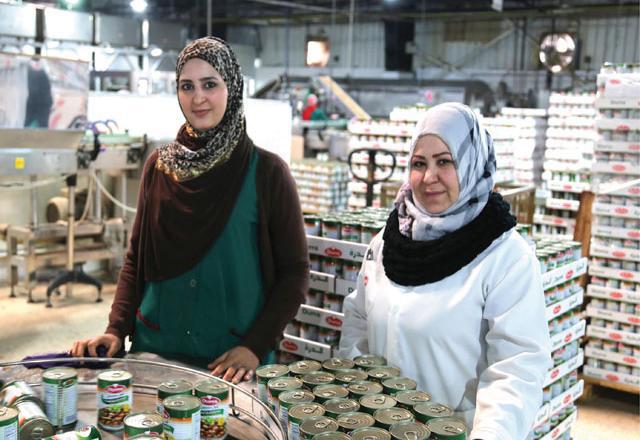You are here
Labour Ministry, USAID sign ‘flexible working hours’ agreement
By Ana V. Ibáñez Prieto - Apr 21,2018 - Last updated at Apr 21,2018
AMMAN — The Ministry of Labour and the Higher Population Council (HPC) on Thursday signed a cooperation agreement with USAID, aimed at boosting the participation of women in the labour market through the implementation of flexible work arrangements.
During the signing ceremony, Labour Minister Samir Murad stressed that “the flexible working hours system comes as a joint effort exerted by the national committee formed by the Ministry of Labour and its strategic partners, aspiring to activate the participation of the Jordanian women in the national economy".
In March, a Royal Decree endorsed the Cabinet’s decision on the flexible working hours by-law for 2017, aimed at increasing the economic participation of various segments of society by opening up “new and innovative” opportunities in the workplace.
Workers who have been in their jobs for three consecutive years, workers with family responsibilities, university students and workers with disabilities are expected to benefit from the by-law, according to an infographic published by the prime minister’s office.
Elaborating on the Royal Decree approved last year, Murad pointed out that “this system mainly serves working women, and it is an achievement”, explaining that the new agreement comes in line with the 2018 Flexible Work Instructions issued under Article 13 of the Flexible Labour Law No. 22 of 2017.
"The government is keen on promoting the participation of women in various sectors by applying the principle of justice and equal opportunity through social policies,” the minister added, noting that the increase of female participation in the labour market will have “a significant impact on the advancement of the national economy".
For her part, HPC Secretary General Maysoon Zoubi highlighted that flexible work arrangements “serve the council's efforts in the field of the economic empowerment of women by increasing their participation in the labour market [and] helping them to overcome many of the dilemmas that arise in the work environment".
In a similar vein, USAID Mission Director in Jordan Nancy Eslick highlighted the importance of flexible work arrangements as means to increase the economic participation of women, highlighting that “this system supports working families and empowers women to contribute to the development of Jordan, proving the Kingdom’s commitment to innovative solutions to overcome the country's economic and social challenges".
The proper implementation of flexible working hours was one of the main issues addressed in the recommendations submitted to Parliament in February this year by a coalition of 11 organisations focused on the achievement of a more gender-sensitive Labour Law.
"This is a very positive step and we are glad they took most of our recommendations into consideration, but there is still work to be done," International Labour Organisation Gender Consultant Reem Aslan told The Jordan Times in a recent interview, explaining that right now, "the challenge is to educate the employers on the regulations and instructions to apply the flexible working hours at the workplace".
"We will still need an awareness campaign and incentives for employers to make companies abide by the flexible work arrangements,” Aslan continued, pointing out that “nonetheless, these regulations also bring value to the employers, since flexible working hours allow companies to increase the productivity while decreasing the costs".
In addition, the expert highlighted that “contrary to popular belief, flexible work arrangements not only benefit women but any individual with family responsibilities, let alone university students working at part time jobs and persons with disabilities".
Related Articles
AMMAN — Minister of Labour Samir Murad on Monday disclosed the findings of a study on flexible working models in Jordan, which showed that m
AMMAN — The Social Security Law must be reviewed in order to match the flexible working hours by-law of 2017 according to a report iss
AMMAN — The Jordan Labour Watch (JLW) on Thursday issued a position paper in cooperation with the Friedrich Ebert Foundation (FES) calling f


















